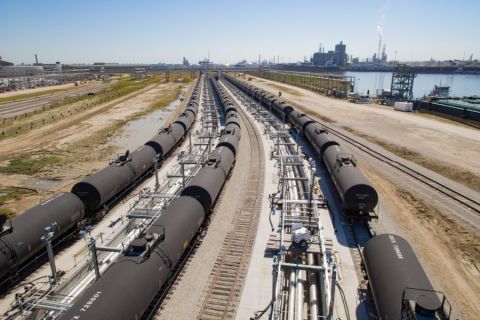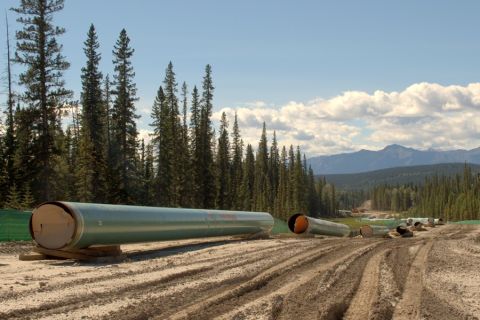Many energy investors are disappointed when stock prices fall. These would be investors who bought at a peak. Craig Callahan and J.C. Waller at the Icon family of funds are probably glad to see it. Soon it will be time for them to buy. In the institutional-ownership world, the $94-million Icon Energy Fund is one of those known as a "black box" investor-data is put in and which stocks to buy are spit out. There is little or no communication with an energy company's managers. Although the method may seem dubious, the results have not been: the Greenwood Village, Colorado-based fund has returned an average 12% annually since it was formed in 1997 by Meridian Investment Management. The fund is on the Schwab Select list and has a five-star rating by Morningstar. Callahan, Meridian chief investment officer, was a finance professor at the University of Denver and director of research for an area brokerage firm when he cofounded Meridian in the 1980s. Waller, who heads management of the energy fund, comes from the military and received his bachelor's degree from Southwestern Oklahoma State with a focus on business and finance. Callahan says, "We do not hire people from other money-management firms. We like good people with a genuine interest in the stock market and whom we can train to our methods. We support them through their MBA and CFA studies but it would be disruptive to us to take somebody from another firm and debrief them and teach them our ways." He and Waller discussed their investment strategy with Oil and Gas Investor recently. Investor Do you operate on a "don't call us and we won't call you" basis? Callahan We don't talk to management and we don't visit companies. Their public-relations firms send us press releases, and we throw them away. Investor How are you turned onto companies, then? Callahan We maintain our database, and we look for industries that are overpriced-to sell-and underpriced, to buy. The database tells us. We would never take an outside opinion on what stock to buy. We purchase data and then maintain our own system. We never purchase opinions and we never look at opinions. Investor Dealing in energy stocks, there seems to always come a time when the whole business is overpriced. Do you completely divest then and sit on the cash until another bust? Callahan That's the whole foundation of our system-going through time believing an industry as a whole gets overpriced and it's time to sell it, and then drop back and buy an industry that is underpriced, believing it could lead the next theme. Investor So there are times when your energy fund is completely divested? Callahan We work off the Standard & Poor's system of sectors and industries. The energy fund invests in S&P's definition of the energy sector. Within that sector are five industries: oil and gas drilling, exploration and production, equipment and services, integrated oil and gas, and refining and marketing. We can usually find some or a couple of industries in the energy sector we like. Investor Which industry do you like right now? Callahan Well, we're extremely heavy on the first three right now and extremely light on the other two. Investor When will the first three become overpriced? Callahan We don't have to guess when that will happen. We just have to recognize when it does. They become overpriced when investors finally believe and jump onto that bandwagon. They're willing to pay a premium to become a part of that theme, and they may be giving us some other industries on sale then that may have become out of favor. Investor Within each industry, do you find overpriced and underpriced stocks? Callahan We start at the bottom. We apply our valuation equation to individual stocks but the primary purpose of that is to tell us whether we like that industry or not. If we do like the industry, we go back and pick our favorite individual stocks. And, you're right-they're not all exactly the same. Some are more on sale than others and some may be fully priced. We then favor the ones that are bargains. Investor Do you keep an eye out for stocks that are being punished, such as how Halliburton and the Williams Cos. have been recently? Callahan There is a second standard we apply before we will buy an industry. We look at value but as you know, value alone can be early-sometimes things are on sale and they just stay on sale. We also compute relative strength on an industry basis. That is how an industry is performing, compared with the market during the previous six months. And we need relative strength to be above 1-that means the industry was stronger than average during the previous six months. So we buy industries that have two things going for them-they're on sale and they're beginning to show strength. You mentioned two stocks that may be bargains, but they're just sluggish or they're getting beat up. Well, it's not their time yet and our relative-strength reading would keep us away from them. Investor Would it be unusual for you to get into a stock and within a week, for example, get out of it? Do you play a stock longer than that? Callahan Our typical holding is well over a year because we ride themes that typically last one to two years. Our turnover is fairly low by sector-fund standards. We buy a basket of stocks and hold that basket for the entire time that we like that industry or we ride a theme-that's typically one to two years. We do not react to quarterly earnings announcements. We do not react to well-drilling success or failure. We do not react to events, generally. Investor The drilling contractors' stocks, for example, are rising this spring-sooner than anticipated. If your drilling stocks became overpriced within three months of moving into that industry, would you sell that soon? Callahan Sometimes themes come and go faster; sometimes a theme might last three years. So our turnover is dictated to us by industry leadership changes in the market. Sometimes those are faster and sometimes slower. But you're right, it could be fast-well, three months would be a little quick. Sometimes you might have a rally that lasts as quickly as six months, things get overpriced and there is some new theme waiting. It could happen. Investor What is your impression of the energy business? Is it haphazard? Is it missing the boat? Is owning the stock strictly for playing commodity-price cycles? Callahan We also screen for quality. We favor high-cash, low-debt companies and ones that are well managed. We don't visit companies. We don't talk to their PR representatives. We look at the last 10 years of income statements, balance sheets and financial ratios. That tells us how a company has behaved. We judge from that whether they're well managed or not. We don't want them telling us what they think they're going to do. We look at what they actually have done. We favor companies that control how they go through time-companies that set targets and hit those targets, are efficient and become more efficient. This is a commodity-based business, and there is more volatility in company statements than in some other sectors. To some extent they are at the mercy of a commodity price that, in addition to the cycles of an economy, causes them problems. Nevertheless, there are some that handle that better than others. There are some that still control how they go through time-they plan, they set targets, they're efficient. In our screening, we favor those that do the best they can to control-they can't control the price of oil but they sure can control some of the business aspects of running a company. Investor What are some companies that have impressed you? Waller One that has been able to control its business is Unit Corp. Also, Patterson-UTI has some of the qualities Craig mentioned. Investor What about Apache and Anadarko Petroleum? Waller We assign companies a rating of 1 to 5 with 1 being the best. I have given them a quality ranking of 2, so apparently they control some of the items they're able to. Callahan They're better than the average but not outstanding. Investor Was there ever a time when energy stocks were so overpriced it was hard to find a bargain anywhere? Waller It seems there is always something on sale. Callahan Remember, we have that relative-strength requirement. Last summer, we got up to about 21% cash in the energy fund because we sold things that were overpriced and we couldn't find new companies that met both of our needs-value and relative strength. Investor When was this? Callahan Late June, early July. Refiners were a large part of our fund in the first half of 2001, so that's what we sold in the summer, and we couldn't find a replacement. When we went back in, after September, we went toward the drilling and equipment/services industries. Investor Do you find drillers and equipment/services lead the market? Callahan I don't know if that's the law of the market but in the last couple of strong energy markets, that has happened. Investor What is your impression of the energy-trader stocks-the Enrons? Callahan These are in the "telecommunications and utilities" sector, by the S&P definition. We have never owned Enron stock, although we have a telecommunications and utilities fund. It was never a bargain. We always judged it to be overpriced. We didn't even get to the quality screen. Investor What about sellside analysis? Callahan Well, we don't use any of it, so that tells you something. The biggest weakness with it is sellside analysts tend to behave as a herd and they don't have nerve enough to be individuals. They all like technology at the peak; they all don't like energy at the bottom. There appears to be a real powerful force to conform. I don't know what it is. There is a behavior that has really gotten to puzzle me. I bought my first stock in 1972 when I turned 21, so I've followed the markets over a few decades. It used to be an analyst trying to come up with an earnings per share for the company would put together pro forma income statements, try to estimate expenses and revenue and work their way down to an independently determined earnings per share. Now, they call the company and ask them what earnings will be, and they call that analysis. They may have a Wharton MBA but they just call up the company. That's the last people I'd ask what earnings are going to be. And the whole notion that a public company has to issue warnings-it is ridiculous for a company to have to tell investors a quarter ahead of time what earnings are going to be. The only obligation is to tell earnings after they come out. So for a company to issue any kind of future forecast on earnings, to me, is silly and I don't know how it has evolved to that. Investor Have you observed trends in the sector recently that are counter to tradition? Callahan Here's an observation. First I'll start with the entire U.S. market, and then I'll get back to energy. Our system has favored industries with more small- and midcap companies-not because of a top-down directive, it's just because we run our system and look back at what we've bought and it has tended to be industries with small- and midcap companies. My only explanation is that in times of uncertainty, investors have been clinging to the large-cap household names seeking comfort and that makes them still overpriced, and at Meridian we don't pay a premium for overpricing or names. Getting back to energy, we generally have not liked the big household names. They just haven't been on sale. Investor Apparently Phillips Petroleum was on sale at one time. Do you still own some Phillips shares? Callahan Yes we do. Actually, it's less than 1% of the energy fund. The integrated oil and gas industry, which typically has some of the larger market caps, only makes up 3.2% of our fund currently. Waller In refining and marketing, we only have three names-Ashland and Sunoco are two-and that's 8% of the fund. Investor I'd like to ask what stocks you like right now, but readers won't see this for a few more weeks. Waller I don't see changes during the next six weeks, unless there is some catastrophe. Callahan While we don't predict when this theme-drilling, E&P and equipment/services-would end, it would be very surprising for it to end for eight to nine more months, at least. Investor Do you have any idea why natural gas prices are rising? Do you even look at commodity prices? Callahan No, we don't. I can say that any thoughts of recession are behind us. There's going to be a recovery. We don't have to predict whether it is huge or rapid, just a recovery, and energy is part of that anticipation. So mildly higher gas prices could be part of that.
Recommended Reading
Canadian Railway Companies Brace for Strike
2024-04-25 - A service disruption caused by a strike in May could delay freight deliveries of petrochemicals.
Enterprise’s SPOT Deepwater Port Struggles for Customers
2024-04-25 - Years of regulatory delays, a loss of commercial backers and slowing U.S. shale production has Enterprise Products Partners’ Sea Port Oil Terminal and rival projects without secured customers, energy industry executives say.
Report: Crescent Midstream Exploring $1.3B Sale
2024-04-23 - Sources say another company is considering $1.3B acquisition for Crescent Midstream’s facilities and pipelines focused on Louisiana and the Gulf of Mexico.
For Sale? Trans Mountain Pipeline Tentatively on the Market
2024-04-22 - Politics and tariffs may delay ownership transfer of the Trans Mountain Pipeline, which the Canadian government spent CA$34 billion to build.
Energy Transfer Announces Cash Distribution on Series I Units
2024-04-22 - Energy Transfer’s distribution will be payable May 15 to Series I unitholders of record by May 1.




